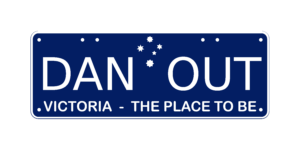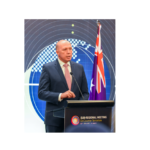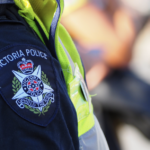VicRoads Cancels ‘DANOUT’ Number Plates for Being ‘Offensive and Inappropriate’

The Melbourne Man who had cheeky and harmless number plates that mention Victoria’s Premier, Dan Andrews, has had to give them up in order to be able to drive.
Peter Dunlevie received a letter from VicRoads six months ago telling him that the ‘DANOUT’ number plates he’d paid and registered for his Holden Commodore were ‘offensive’ and inappropriate.
The plates were cancelled around the time of the Victorian state election in November last year when Dan Andrews – to the surprise of many – went on to win a third consecutive term as head of the state.
Number plates ‘offensive and inappropriate’
Despite harsh rules and regulations and long pandemic lockdowns, and the inherent criticism of of these, the majority of Victorians remained confident in his leadership, and Mr Dunlevie’s number plates caused no harm to the election result.
And yet – Mr Dunlevie was told that he would need to hand his registration plates in, or his vehicle registration would be suspended.
He appealed the decision and lost.
According to VicRoads, the number plates contained ‘a negative and/or inappropriate social message deemed inappropriate for display’, despite the fact that they were approved when they were originally applied for and were installed on his vehicle.
Welcome to 2023. Once upon a time in Australia, authorities and politicians could take a joke. Now, satire is almost a thing of the past – killed off because it has become something that is more than likely to end a person in trouble with the authorities or on the wrong end of a defamation suit.
Power of Roads and Maritime Services (RMS) in NSW to issue and cancel number plates
Here in New South Wales, the power of the RMS to regulate number plates is primarily contained in the Road Transport (Vehicle Registration) Act 1997 and Road Transport (Vehicle Registration) Regulation 2017.
These laws give the RMS broad powers regarding the issuance and cancellation of number plates in our state, and prescribes several offences for failing to follow the rules; including offences for using plates not issued by the authority, not displaying plates, altering plates and even the owner of a vehicle failing to take reasonable precautions to prevent a contravention of the rules by another person.
Free speech? Apparently not in Australia
Perhaps of even more concern than the sweeping discretionary power of roads authorities is the fact that while Australia is meant to be a democracy, there are so many laws that limit free speech and freedom of political choice and expression in our nation.
And while the situation in which Mr Dunlevie found himself may seem trivial, what appears to have occurred is that his freedom of political communication via the number plates has been curtailed, and it’s important to note that freedom of political communication has been inferred into the Australian Constitution by the highest court in the land, the High Court of Australia.
These ‘little’ incursions by governments can add up, and eventually have the potential affect us all.
Indeed, freedom of expression and speech are – and should be – vital to a healthy, functioning democracy.
What is Freedom of Opinion?
According to the Attorney General’s website, “The right to freedom of opinion is the right to hold opinions without interference, and cannot be subject to any exception or restriction.
The right to freedom of expression extends to any medium, including written and oral communications, the media, public protest, broadcasting, artistic works and commercial advertising. The right is not absolute. It carries with it special responsibilities, and may be restricted on several grounds. For example, restrictions could relate to filtering access to certain internet sites, the urging of violence or the classification of artistic material.”
While Australia doesn’t have a bill of rights to specifically protect human rights such as these, the AG’s website explains that:
“Australia is a party to seven core international human rights treaties. The right to freedom of opinion and expression is contained in articles 19 and 20 of the International Covenant on Civil and Political Rights (ICCPR).”
Limitations to freedom of expression
Under article 19(3) freedom of expression may be limited as provided for by law and when necessary to protect the rights or reputations of others, national security, public order, or public health or morals. Limitations must be prescribed by legislation necessary to achieve the desired purpose and proportionate to the need on which the limitation is predicated.
These vague definitions don’t make the case for censorship of the numberplates any clearer for Mr Dunlevie.
Further, our politicians, as is well documented, take swipes at each other every day under the guise of ‘political process’ and yet the moment an ordinary citizen does the same, they’re ‘out of line’?
In fact recent ‘reviews’ into workplace culture in politics at both a state and federal level have attested to prevalent harassment, discrimination, bullying and misconduct.
Eroded freedoms mean an eroding democracy
As has been said many times, a healthy democracy thrives on differences of opinion, on healthy, robust discussions and debate about political office holders and candidates in order for the general voting public to be well-informed to be able to make a sensible, considered decision on voting day. It should also be explicit within the definitions of democracy that politicians can be criticised when appropriate because this provides valuable feedback which, in theory, would make the democratic governing process better, stronger, more efficient.
However, numerous laws passed in recent years, the criminalisation of protesting in New South Wales, are slowly encroaching on these freedoms.
Certainly, the rise in defamation lawsuits has made most people very careful about what they say, or publish, in the public domain.
In Victoria, as in New South Wales, if Mr Dunlevie wishes to take the matter further, he can make a formal complaint to the Victorian Ombudsman, or take the matter to court.







